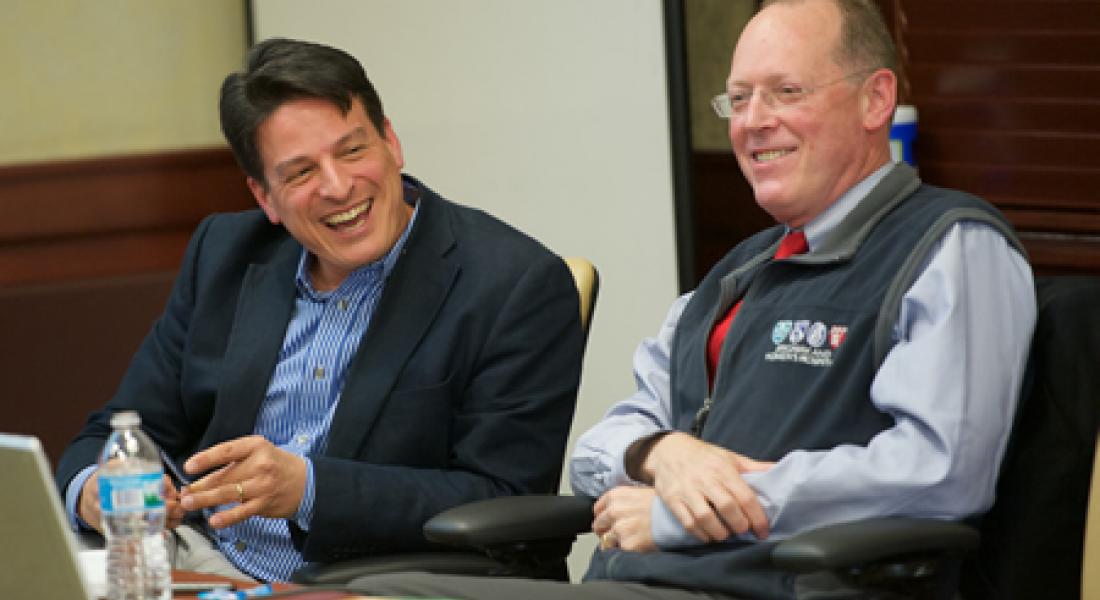
Over the past several years, the Kellogg Institute has partnered with scholars, practitioners, and the global health pioneer Partners In Health (PIH) to consider how the notion of “accompaniment” might inform—and even transform—the practice of international development and aid delivery.
“We are reframing the concept of development from a donor-recipient relationship to one of walking together in accompaniment,” says Kellogg Executive Director Steve Reifenberg, who organized the April series “From Aid to Accompaniment” to further both an ongoing book project and a wide-ranging discussion of the implications of the accompaniment approach.
“Drawing on the work of Partners In Health and the research of our faculty fellows, we are developing a model of international development that offers powerful insights into how development aid can be significantly more effective,” Reifenberg says. Drawing inspiration from the writings of Faculty Fellow Rev. Gustavo Gutiérrez, OP, the accompaniment model promotes sustainable partnerships and investment in local and national institutions.
Events in the “From Aid to Accompaniment” series included an authors’ workshop to review the book manuscript; a public workshop bringing together scholars, practitioners, and students to discuss the practice of accompaniment; and an impassioned public address by physician-anthropologist and PIH cofounder Dr. Paul Farmer. (See Reifenberg’s Notre Dame Magazine article on the public talk here.)
The gatherings were the latest in a series hosted by the Kellogg Institute to bring practitioners associated with PIH together with scholars and policy makers to reflect on what accompaniment can bring to the development process.
“Accompaniment has infused the work of Partners In Health for a long time,” said Reifenberg, who serves on the PIH board and is coediting the book project. “However, it has been rare for PIH leadership to be able to come together to talk in an extended fashion about the core values that underlie and inspire their work.”
Time spent together at Notre Dame has proved a singular opportunity to crystallize what PIH and others like it have learned from the practice of accompaniment. Growing out of these exchanges, the book project aims to present the theory behind the accompaniment approach and convey how it can be operationalized across distinct levels of policy and practice.
This year’s series brought together 10 practitioners affiliated in various capacities with PIH, including Farmer and cofounder Ophelia Dahl; 20 members of the Notre Dame faculty and staff—including 12 Kellogg faculty fellows; and 6 additional development practitioners and scholars involved in the book project.
“It takes a while to seep in how radical this notion can be,” said Farmer during one of the sessions. “What does it mean to use accompaniment to push for social and economic justice?”
Jéhane Sedky of the UN, who has worked with Farmer in his various roles advising the UN on Haiti policy, noted the importance of aligning aid “100 percent” with national plans and then using country systems to deliver aid.
Supporting public institutions to do their job is a key point in the PIH accompaniment model. Other elements include: partnering with discernment, making job creation a benchmark of success, buying and hiring locally, providing cash to the poorest, supporting regulation of non-state service providers, and applying evidence-based standards that offer the best outcomes.
It is essential to set the same aspirations for development that “we would expect for ourselves or our children,” said Dahl.
Accompaniment in practice
Kellogg faculty fellows took part in both the book workshop, where they offered critical feedback to the work-in-progress, and the public workshop, where they presented research that highlighted accompaniment in practice.
-
Faculty Fellow Matt Bloom and Senior Research Scientist Deirdre Guthrie presented a initial findings from study of community health workers in the PIH affiliate in Mexico, Compañeros En Salud, part of the larger “Wellbeing at Work” project.
-
Faculty Fellow Terence Johnson and Ford Program East Africa Regional Program Coordinator Jackline Aridi discussed the relational power of mentorship evidenced in the randomized controlled trial “Empowering Entrepreneurs” that Johnson and two other economists are conducting in Kenya.
-
Faculty Fellow Tracy Kijewski-Correa described the use of a human-centered design process to co-create housing solutions in Haiti with community members in the Engineering2Empower (E2E) project. “We found the solution that was always inside us—but no one had ever taught us how to find it,” one participant told her.
It is a "personal and relational" process that requires vulnerability and patience “for the long game,” explained physician and community-based healthcare expert Evan Lyon. “Walking together is a mutual experience,” said Faculty Fellow Rev. Daniel Groody, CSC.
A persistent theme of the workshops and Farmer’s public address was how best to reach others—many millions of others—with these ideas.
The power of accompaniment lies in its ability to resonate within each one of us, said John Paul Lederach of the Kroc Institute for International Peace Studies.
"We need to shift the imagination of the human community," he said. “People need to get hooked.”
Reifenberg hopes that the book From Aid to Accompaniment (PublicAffairs, forthcoming) is part of that shift.
“The book has the potential to bring stories of accompaniment together in an enormously constructive way and create a web of connections,” he says. “I am convinced that the products of our collective labor will have a large, life-giving impact.”





